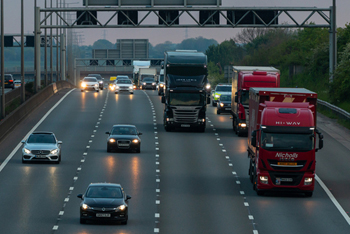The head of the independent consumer watchdog for transport users has described road capacity issues as a 'very large elephant in a very small room' and suggested that some change will be needed in how we pay for the network.
Anthony Smith, chief executive of Transport Focus, said that roads do have a future in a net zero world, but that some form of road pricing could be needed to manage further growth of vehicle use.
'There is a very large elephant in a very small room, which is road capacity. Someone is going to have to do some creative thinking about that and the decline of road taxes. There is something that needs to happen there,' he said.

Mr Smith said the logistics sector 'have had a good crisis'
'There are a few rumours circulating; you get the sense the Government machine is sort of thinking about all this and needs to do something. The roads have to be there for everyone. People want them and need them. I think the way we pay for them is going to change significantly.’
Mr Smith added: 'I think the last 18 months have really underlined just how crucial the country’s roads are to keep the country fed and well, and moving. And the logistics sector have had a good crisis quite frankly. So roads do have a massive future. Rail and bus help out but let’s face it most of us get our kit by road.'
Alongside him on stage at an industry event for highways was Nick Harris, chief executive of strategic road network operator National Highways.
Mr Harris said that traffic numbers had all but increased to pre-pandemic levels on the SRN now and in some areas - especially around logistical hubs - traffic had actually surpassed those levels mainly due to the growth in goods vehicles related to internet shopping.
While building more roads raises controversy due to induced demand and environmental issues, National Highways' attempts to expand capacity through smart motorways have also provoked safety concerns.
MPs on the transport select committee have now called for a halt to the rollout of any further smart motorway schemes until more data is collected on safety.
Addressing the public's lack of confidence in smart motorway safety, Mr Smith said: 'The key to the confidence is [National Highways] and the police and others, working on making sure people know that if they stop in a live lane they are being watched and they are being looked after and reassuring them that the speed in which [we are] getting to people is reducing the whole time.'
Register now for full access
Register just once to get unrestricted, real-time coverage of the issues and challenges facing UK transport and highways engineers.
Full website content includes the latest news, exclusive commentary from leading industry figures and detailed topical analysis of the highways, transportation, environment and place-shaping sectors.
Use the link below to register your details for full, free access.
Already a registered? Login